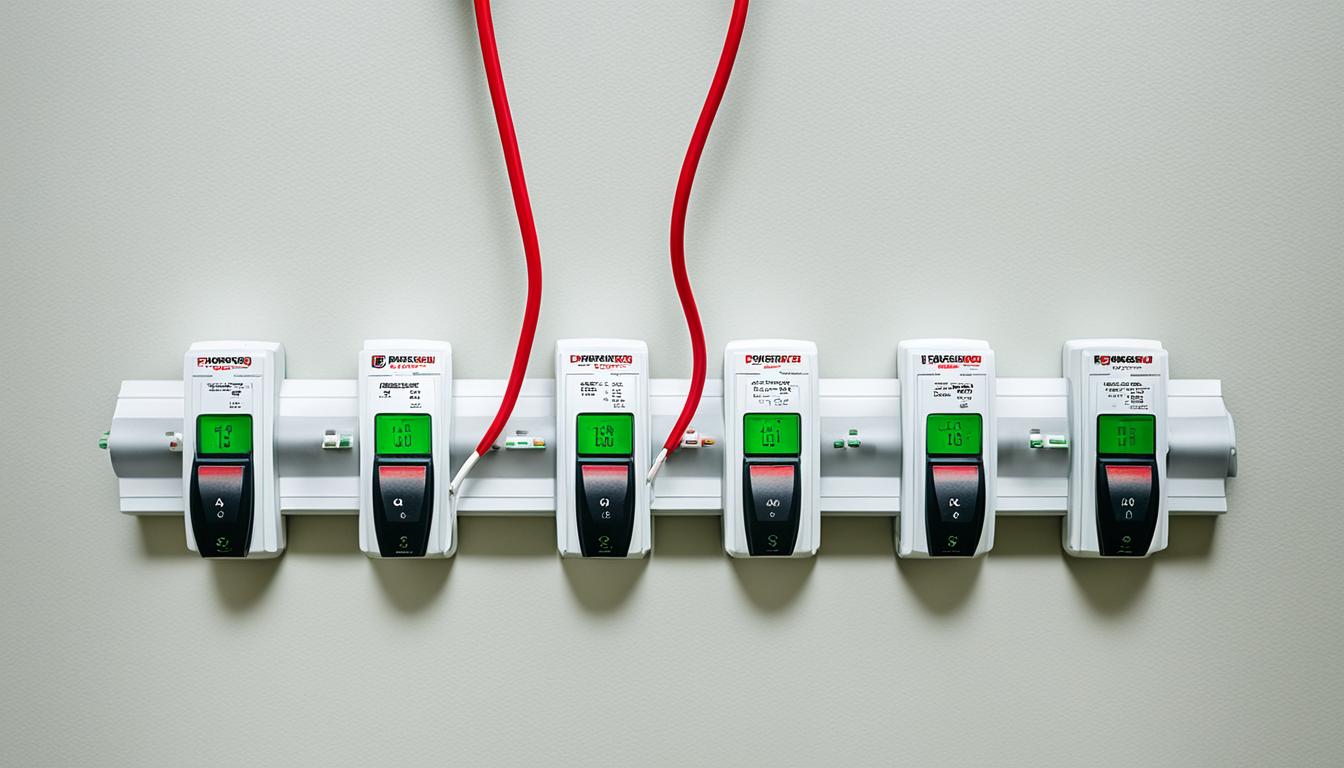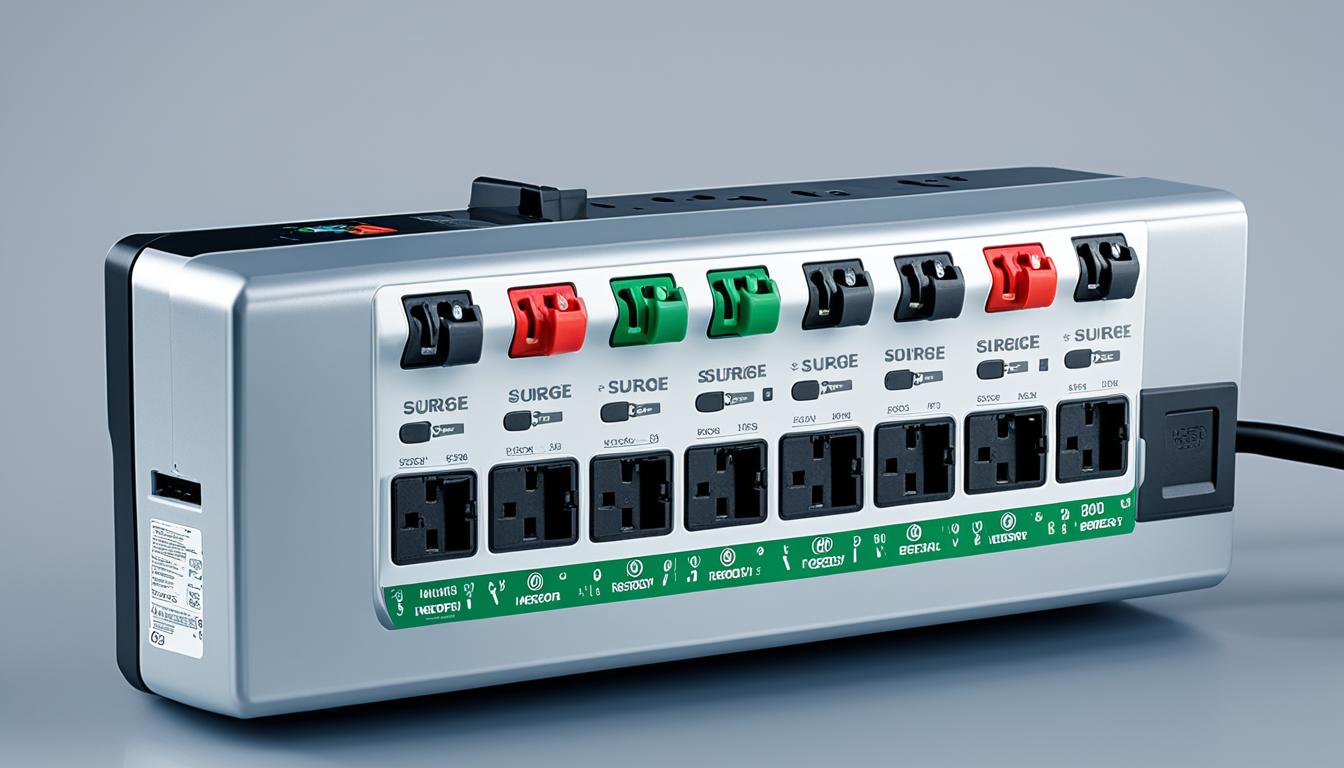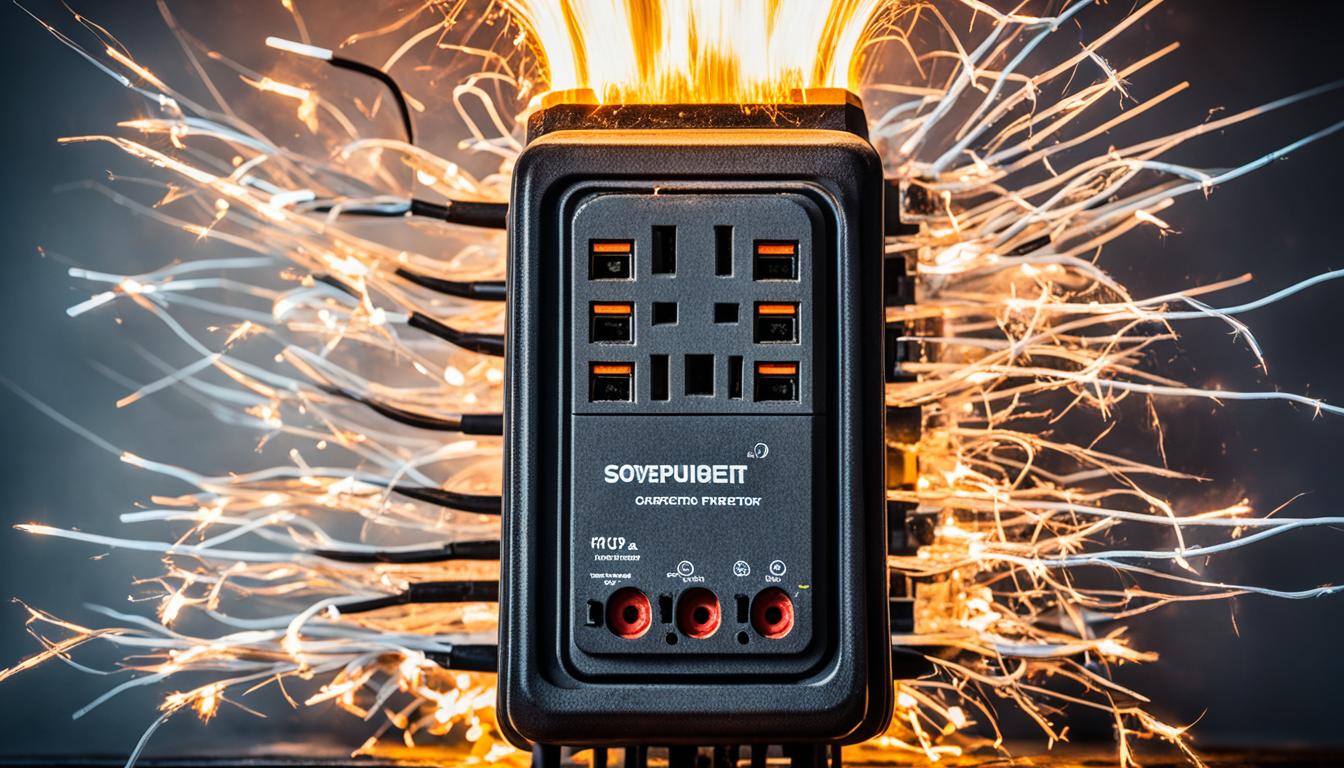extensioncords.site and its partners may earn a commission if you purchase a product through one of our links
When it comes to using a power strip with an extension cord, there are some important safety considerations to keep in mind. While it is technically possible to plug a power strip into an extension cord, experts recommend against it due to potential safety hazards. Faulty wiring, power surges, and inadequate power outlets can increase the risk of electrical fires and electrocution.
It is crucial to ensure that the gauge size and amperage of both the power strip and the extension cord match to avoid overloading the electrical system and starting a fire. Additionally, high-wattage appliances should not be plugged into a power strip, as it can lead to overheating. It is important to remember that using a power strip and extension cord together should only be a temporary solution until a qualified electrician can provide permanent and safer options.
Key Takeaways:
- Plugging a power strip into an extension cord can pose safety hazards.
- Mismatched gauge size and amperage can overload the electrical system.
- High-wattage appliances should not be plugged into a power strip.
- Using a power strip and extension cord together should only be a temporary solution.
- Consult a qualified electrician for permanent and safer options.
The Importance of Surge Protection
Surge protectors are an essential component in safeguarding your electrical equipment and devices from unexpected power surges. These surges can occur due to a variety of factors, such as faulty wiring, power outages, or lightning strikes. By investing in surge protection, you can ensure the longevity and functionality of your valuable electronics.
Surge protectors are particularly crucial for older homes that may have inadequate power outlets or outdated circuit breakers. They serve as a vital defense against electrical surges that can damage or destroy sensitive devices like computers, televisions, and appliances.
One of the primary functions of surge protectors is to prevent excessive electrical voltage from reaching your appliances and devices. This is achieved through a combination of protective components and technology that divert excess voltage safely to the ground. By doing so, surge protectors act as a buffer, absorbing the impact of power surges and shielding your electronics from potential harm.
While surge protectors are designed to be compatible with various electrical setups, it is important to note that using them in conjunction with extension cords is not recommended. The combination of a surge protector and an extension cord increases the risk of fire and electrical hazards. It is best to directly connect your surge protector to a properly installed outlet to ensure optimal performance and safety.
“Using a surge protector in tandem with an extension cord can compromise the overall effectiveness of the surge protection, leaving your devices vulnerable to potential damage.”
The Risks of Using Extension Cords with Surge Protectors
When surge protectors are used as intended, they are incredibly effective at diverting excess voltage and protecting your electronics from power surges. However, combining them with extension cords can nullify these protective capabilities and increase the risk of electrical damage or fire. Here’s why:
- Inadequate Power Delivery: Extension cords are not designed to handle the same level of power as a grounded outlet. This can result in inadequate power delivery to your surge protector, potentially rendering it less effective in mitigating surges.
- Faulty Wiring: Extension cords can be prone to wear and tear, including fraying or exposed wires. When combined with a surge protector, this increases the risk of electrical arcing, shorts, and potential fires.
- Potential Overload: Plugging multiple devices into an extension cord connected to a surge protector can exceed the power load capacity of both the extension cord and the surge protector. This can result in overheating and the risk of electrical hazards.
For the best surge protection, it is recommended to directly plug your surge protector into a properly grounded outlet. This ensures uninterrupted power delivery and maximizes the effectiveness of surge protection for your valuable electronics.
Remember, surge protection is a critical investment in the safety and longevity of your electronics. By following recommended usage practices, you can significantly reduce the risk of damage caused by power surges and ensure your devices operate optimally.
Proper Use of Power Strips
Using power strips safely involves understanding their limitations and following proper usage guidelines. It is crucial to use a power strip that is designated as a surge protector if you want protection against electrical power surges. Not all power strips provide surge protection, so it is important to check for the appropriate labeling. High-capacity appliances such as refrigerators, washing machines, and space heaters should never be plugged into a power strip, as they can overload the strip and pose a fire hazard.
Power strips should only be used for low-load electronics such as computers, phones, lamps, and stereos.
Additionally, it is important to avoid “daisy-chaining” power strips or plugging them into extension cords, as this can violate electrical codes and increase the risk of accidents.
| Do’s | Don’ts |
|---|---|
|
|
By following these guidelines, you can ensure the safe and proper use of power strips, reducing the risk of electrical hazards and fires.
Expert Tip:
“Using a power strip designated as a surge protector is essential for protecting your valuable electronic devices from power surges. Always read the label and choose the right power strip for your needs.”
Using Extension Cords Safely
When it comes to electrical safety, it is important to understand how to use extension cords properly. Extension cords should be used for temporary purposes only, such as powering tools or appliances for short periods of time, typically hours or days. They should not be used as a long-term solution, especially for high-wattage electronics like computers or refrigerators.
It is crucial to ensure that the extension cord you are using is listed by a recognized testing lab and marked as such. This certification guarantees that the extension cord meets safety standards and has undergone rigorous testing. Homemade extension cords are not permitted and can pose a safety risk, so it is best to use commercially available ones.
Regular inspection of your extension cords is essential to ensure their safety. Look for any signs of damage such as fraying wires, cracked plugs, or exposed conductors. Overheating is also a concern, so be sure to touch the cord during use to check for excessive heat. If you notice any damage or overheating, immediately replace the extension cord to prevent accidents.
When using extension cords, it is important to consider the environment they will be in. Avoid using extension cords near water or in damp areas, as this can increase the risk of electrical shock. If you need to use an extension cord in a wet location, make sure it is equipped with a ground fault circuit interrupter (GFCI) protection to prevent electrical accidents.
“Using extension cords safely involves proper maintenance, regular inspections, and understanding their limitations. By following these guidelines, you can minimize the risk of electrical hazards and ensure a safer environment.”
Remember, extension cords are designed for temporary use and should never replace the need for additional electrical outlets. If your home or workspace lacks sufficient outlets, it is best to consult with a qualified electrician who can provide permanent and safer solutions.
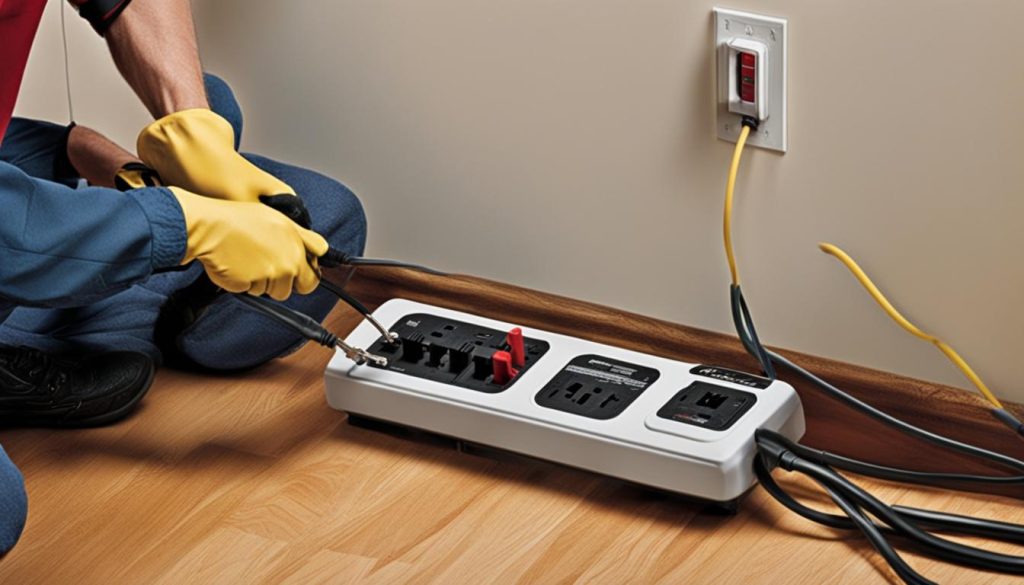
Safety Tips for Using Extension Cords:
- Use extension cords for temporary purposes only.
- Ensure that the extension cord is listed by a recognized testing lab.
- Regularly inspect extension cords for damage or overheating.
- Avoid using extension cords near water or in damp areas.
- If using an extension cord in a wet location, use one with GFCI protection.
Safety Guidelines for Power Strips and Extension Cords
When it comes to using power strips and extension cords, following safety guidelines is crucial to prevent electrical accidents and fire hazards. By adhering to these guidelines, you can ensure the safe and efficient use of power strips and extension cords in your home or office.
Plug Power Strips Directly Into Outlets
Power strips should always be plugged directly into a properly installed outlet. Plugging a power strip into another power strip or an extension cord, also known as “daisy-chaining,” can lead to overloading and increased fire risks. Ensure that each power strip has its own individual and grounded outlet for optimal safety.
Do Not Connect Larger Appliances to Power Strips
Larger appliances, such as microwaves and refrigerators, should never be connected to a power strip. These high-power devices require a direct connection to an outlet to prevent overheating and potential fire hazards. It is important to reserve power strips for low-load electronics like computers, phones, lamps, and stereos.
Avoid Overloading Outlets and Power Strips
Overloading outlets and power strips is a leading cause of electrical fires. Make sure to distribute power usage evenly across outlets and power strips to prevent excessive heat build-up. Avoid plugging multiple high-wattage devices into the same power strip and monitor the total load to avoid tripping circuit breakers.
Use Reliable and Damage-Free Equipment
Always use power strips, extension cords, and multi-outlet adapters that are listed by a nationally recognized testing lab, ensuring their safety and compliance with industry standards. Regularly inspect these devices for any signs of damage, such as frayed wires or cracked casings, and promptly replace or repair them to prevent electrical accidents.
Following these guidelines can help protect your home or workplace from electrical hazards, reduce the risk of fire, and ensure the safe and proper use of power strips and extension cords.
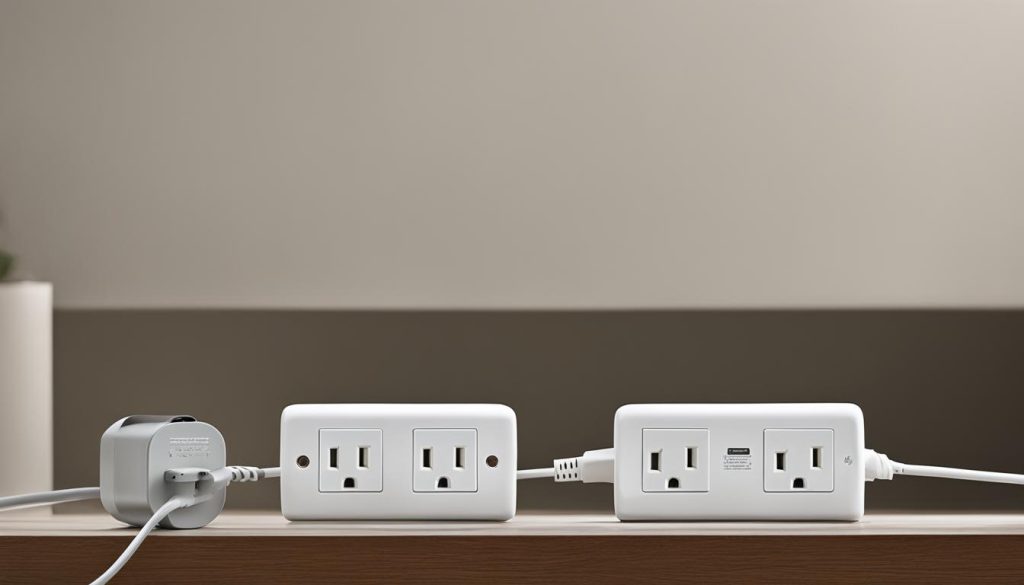
Seeking Professional Electrical Solutions
When it comes to electrical safety, relying solely on power strips and extension cords is not sufficient for long-term peace of mind. To ensure the safety of your home and family, it is highly recommended to seek professional electrical solutions. In cases where there are inadequate power outlets or underlying wiring issues, it is best to consult with a qualified and licensed electrician.
By enlisting the expertise of a qualified electrician, you can benefit from a thorough assessment of your electrical system. They have the knowledge and experience to identify any potential hazards and provide permanent and safer options tailored to your specific needs.
Professional electricians understand the importance of compliance with electrical codes and regulations. They will ensure that all electrical work done in your home meets the necessary standards, minimizing the risk of accidents and electrical failures. Attempting to handle electrical issues without the appropriate expertise can result in accidents, damage to your appliances and devices, and even pose potential harm to yourself and your loved ones.
Prioritizing electrical safety means prioritizing the well-being of your home and family. When it comes to electrical needs, whether it’s installation, repairs, or upgrades, trust the professionals to provide reliable electrical services and peace of mind.
FAQ
Can I plug a power strip into an extension cord?
While it is technically possible, experts advise against it due to safety concerns. Plugging a power strip into an extension cord can increase the risk of electrical fires and electrocution.
Is it safe to use a surge protector with an extension cord?
It is not recommended to use a surge protector with an extension cord. This combination can pose a fire hazard and increase the risk of electrical hazards.
What should I avoid plugging into a power strip?
High-capacity appliances such as refrigerators, washing machines, and space heaters should not be plugged into a power strip. Power strips should only be used for low-load electronics.
Can I use an extension cord as a long-term solution?
Extension cords should only be used for temporary purposes and for short periods of time. Using an extension cord as a long-term solution is not recommended.
How should power strips be used safely?
Power strips should be plugged directly into a properly installed outlet and should not be “daisy-chained” or plugged into another power strip or extension cord. Larger appliances should also be plugged directly into an outlet.
What should I do if my home has inadequate power outlets?
It is best to consult with a qualified electrician to assess your electrical system and provide permanent and safer options. Attempting to handle electrical issues without professional knowledge can be dangerous.
